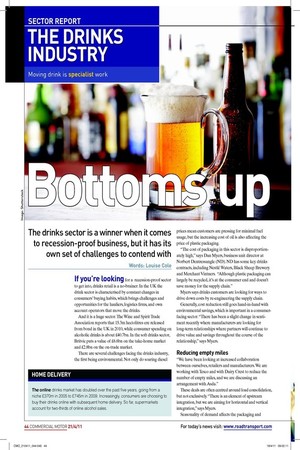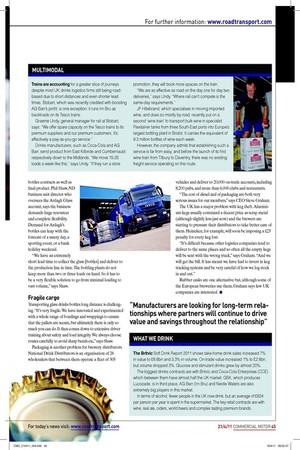ottoms u
Page 36

Page 37

If you've noticed an error in this article please click here to report it so we can fix it.
The drinks sector is a winner when it comes to recession-proof business, but it has its own set of challenges to contend with
Words: Louise Cole Ifyou’re looking for a recession-proof sector to get into, drinks retail is a no-brainer. In the UK the drink sector is characterised by constant changes in consumers’ buying habits, which brings challenges and opportunities for the hauliers, logistics irms, and own account operators that move the drinks.
And it is a huge sector. The Wine and Spirit Trade Association reports that 15.3m hectolitres ere released from bond in the UK in 2010, while consumer spending on alcoholic drinks is about £40.7bn. In the soft drinks sector, Britvic puts a value of £6.6bn on the take-home market and £2.8bn on the on-trade market.
There are several challenges facing the drinks industry, the irst being environmental. Not only do soaring diesel prices mean customers are pressing for minimal fuel usage, but the increasing cost of oil is also affecting the price of plastic packaging.
“The cost of packaging in this sector is disproportionately high,” says Dan Myers, business unit director at Norbert Dentressangle (ND). ND has some key drinks contracts, including Nestlé Waters, Black Sheep Brewery and Merchant Vintners. “Although plastic packaging can largely be recycled, it’s at the consumer end and doesn’t save money for the supply chain.” Myers says drinks customers are looking for ways to drive down costs by re-engineering the supply chain.
Generally, cost reduction still goes hand-in-hand with environmental savings, which is important in a consumerfacing sector. “There has been a slight change in sentiment recently where manufacturers are looking for long-term relationships where partners will continue to drive value and savings throughout the course of the relationship,” says Myers.
Reducing empty miles
“We have been looking at increased collaboration between ourselves, retailers and manufacturers. We are working with Tesco and with Dairy Crest to reduce the number of empty miles, and we are discussing an arrangement with Asda.” These deals are often centred around load consolidation, but not exclusively. “There is an element of upstream integration, but we are aiming for horizontal and vertical integration,” says Myers.
Seasonality of demand affects the packaging and bottles contracts as well as inal product. Phil Shaw, ND business unit director who oversees the Ardagh Glass account, says the business demands huge resources and complete lexibility. Demand for Ardagh’s bottles can leap with the forecast of a sunny day, a sporting event, or a bank holiday weekend.
“We have an extremely short lead time to collect the glass [bottles] and deliver to the production line in time. The bottling plants do not keep more than two or three loads on hand. So it has to be a very lexible solution to go from minimal loading to vast volume,” says Shaw.
Fragile cargo
Transporting glass drinks bottles long distance is challenging. “It’s very fragile. We have innovated and experimented with a whole range of bondings and wrappings to ensure that the pallets are secure, but ultimately there is only so much you can do. It then comes down to extensive driver training about safety and load integrity. We always choose routes carefully to avoid sharp bends etc,” says Shaw.
Packaging is another problem for brewery distributors. National Drink Distributors is an organisation of 26 wholesalers that between them operate a leet of 305 vehicles and deliver to 20,000 on-trade accounts, including 8,200 pubs, and more than 6,000 clubs and restaurants.
“The cost of diesel and of packaging are both very serious issues for our members,” says CEO Steve Graham.
The UK has a major problem with keg theft. Aluminium kegs usually command a decent price as scrap metal (although slightly less just now) and the brewers are starting to pressure their distributors to take better care of them. Heineken, for example, will soon be imposing a £25 penalty for every keg lost.
“It’s dificult because other logistics companies tend to deliver to the same places and so often all the empty kegs will be sent with the wrong truck,” says Graham. “And we will get the bill. It has meant we have had to invest in keg tracking systems and be very careful of how we log stock in and out.”
Rubber casks are one alternative but, although some of the European breweries use them, Graham says few UK companies are interested. ■













































